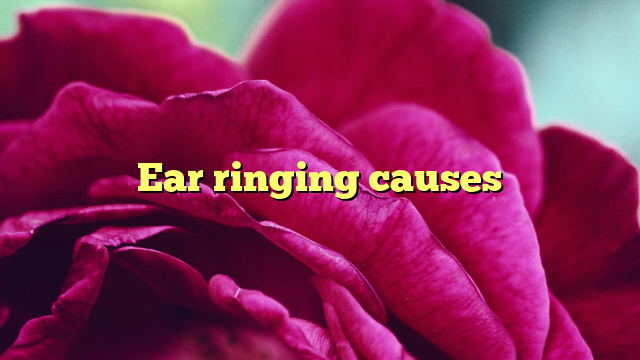If you've ever experienced a ringing, buzzing, or hissing sound in your ears without an external source, you may be suffering from a condition known as tinnitus. Tinnitus can be a frustrating and sometimes debilitating condition, impacting your quality of life. There are several potential causes of ear ringing, ranging from exposure to loud noise to underlying health issues. Understanding these causes can help you identify the root of your tinnitus and seek appropriate treatment.
Common Causes of Ear Ringing
1. Exposure to Loud Noise
One of the most common causes of ear ringing is exposure to loud noise. This can include listening to music at a high volume, attending concerts, working in a noisy environment, or using power tools without ear protection. Prolonged exposure to loud noise can damage the delicate hair cells in the inner ear, leading to tinnitus.
2. Age-Related Hearing Loss
As we age, our hearing naturally deteriorates. Age-related hearing loss, also known as presbycusis, can result in tinnitus as the ability of the inner ear to transmit signals to the brain diminishes. This can lead to the perception of ringing or buzzing in the ears.
3. Ear Infections
Ear infections, particularly in the middle ear, can cause tinnitus. Infections can lead to a build-up of fluid in the ear, disrupting normal hearing and causing ringing or buzzing sounds. Treating the underlying infection can often alleviate the tinnitus symptoms.
4. Earwax Build-Up
Excessive earwax build-up can block the ear canal and interfere with the transmission of sound, leading to tinnitus. Cleaning the ear safely to remove excess earwax can help alleviate the ringing in the ears.
5. Medications
Some medications, including certain antibiotics, antidepressants, and chemotherapy drugs, can cause tinnitus as a side effect. If you suspect your medication is causing your ear ringing, consult with your healthcare provider about alternative treatment options.
6. Underlying Health Conditions
Certain underlying health conditions, such as cardiovascular disease, high blood pressure, thyroid disorders, and Meniere's disease, can contribute to tinnitus. Addressing these health issues can help reduce or eliminate the ringing in your ears.
Conclusion
Ear ringing, or tinnitus, can have a variety of causes, from exposure to loud noise to underlying health conditions. Identifying the root cause of your tinnitus is essential for seeking appropriate treatment and management. If you are experiencing persistent ear ringing, consult with a healthcare provider to determine the best course of action.
FAQs
Q: Can stress cause ear ringing?
A: Yes, stress and anxiety can contribute to tinnitus symptoms or exacerbate existing ear ringing. Managing stress through relaxation techniques and mindfulness practices can help reduce the impact of tinnitus.
Q: Is ear ringing a sign of hearing loss?
A: Ear ringing can be a symptom of hearing loss, particularly age-related hearing loss or damage from loud noise exposure. If you are experiencing both tinnitus and hearing difficulties, it is important to have your hearing evaluated by a professional.
Q: Can tinnitus be cured?
A: While there is currently no cure for tinnitus, there are treatments and management strategies that can help alleviate symptoms and improve quality of life. These may include sound therapy, counseling, and medical interventions depending on the underlying cause of the ear ringing.
Unlock the Secret to a Peaceful Life



